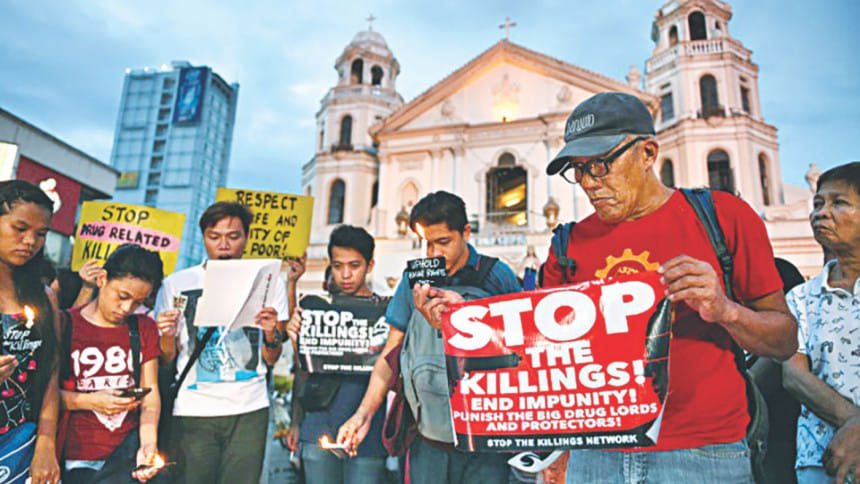Drug abuse must be treated as a public health issue, not a war

In June 1971, in a press conference, US President Richard Nixon declared drug abuse as the "public enemy number one." This was a day after the publication of a message from him to the Congress about devoting federal funds for "prevention of new addicts, and the rehabilitation of those who are addicted," which included the now much-used phrase "war on drugs". No surprise that the parts of the message talking about prevention and rehabilitation had a significantly less impact than the talk of "war", aimed at eradication and incarceration. Since then, the US has spent billions of dollars annually waging this war. The fight has been taken up in other countries as well, with widespread criminalisation of low-level dealers and users.
Bangladesh, following a series of crackdowns which included arrests and deaths of "drugs dealers" in "shootouts", just this week passed new legislation providing for the death sentence of anyone carrying more than the stipulated amounts of certain drugs.
Of course, government efforts in any country vowing to end the drug trade and drug abuse are met with popular acclaim. Drugs ruin lives, put children at risk, destroy families, lead to other criminal behaviour, and so on. That part, we can all agree on. This is a real problem that needs to be dealt with.
But are we asking the right questions in our efforts to eradicate drug abuse? Decades of experience and research from countries which have gone down a war path show only failure. The acclaimed TV show from 2002, The Wire, which focussed on the drug trade in Baltimore, USA, shows how mass criminalisation only leads to at most incarceration of low-level dealers and offenders, leaving no significant impact on the prevalence of use or the trade as a whole. The show was so accurate in its portrayal of institutional failures in dealing with the drug trade, specifically regarding law enforcement efforts to curb drugs, that for a time it was even used at universities in the US as teaching material.
One conversation from the show, between three police officers working in narcotics, sums up the futility of their efforts perfectly. In response to a comment from a fellow officer regarding how they were "fighting the war on drugs … one brutality case at a time," another officer replies:
"You can't even think of calling this … a war."
"Why not?"
"Wars end."
Indeed, a former mayor of Baltimore, Kurt Schmoke, who argued for a radical rethinking of national drug policy, pointing to the futility of America's war on drugs, referred to it as its "domestic Vietnam."
Schmoke was criticising the "war" approach to ending drug abuse as early as 1988. It has been widely pointed out since then that the costs of a war on drugs are simply not borne out by the results. Financially, it is a strain and the social and human rights costs are high. In the Philippines for example, criminalisation has been followed by extra-judicial killings. And, if experience from Mexico, Portugal, Colombia and the USA is any guide, mass criminalisation does little to ebb the supply. That alternative approaches are needed is self-evident.
The question boils down to, as an article published in the Harvard Law Bulletin, titled "Is the war on drugs succeeding?" posed: What constitutes success? What is the aim of the war on drugs? Are we going to measure success in terms of the effect it has on the society or by statistics of how many drug dealers have been arrested or killed? Nixon's war on drugs was aimed at disrupting supply. It was argued that if drugs are not available in the first place, the question of abuse becomes irrelevant. But the succeeding decades have shown that supply always finds a way when there is demand.
One alternative to looking at the problem solely from a criminal and demand-side perspective, is to see it as a social and health issue. The reason we want to stop the drug trade is because of its devastating social impacts. Writing in the New York Times, George P Shultz, a former Secretary of the Treasury and Secretary of State, and Pedro Aspe, a former Secretary of Finance in Mexico, pushed for exactly this: "Both the United States and Mexico need to look beyond the idea that drug abuse is simply a law-enforcement problem, solvable through arrests, prosecution and restrictions on supply. We must together attack it with public health policies and education," ("The Failed War on Drugs", December 31, 2017).
Portugal, a country which faced a crisis of widespread drug usage and massive overdose deaths, in 2001 decriminalised usage of drugs. Instead it approached the problem through the perspective of healthcare, using programmes designed at prevention and cure. Seeing addiction as a disease instead of a crime means the user is not hounded as a criminal but as a patient. The massive healthcare campaign that followed under Prime Minister António Guterres, the present United Nations secretary general, is one of the successes (if only in relative terms) touted as an example of an alternative solution. The usage of heroin in Portugal was reduced by three-fourths in 15 years, and the number of overdose deaths plunged by more than 85 percent ("How to Win a War on Drugs", New York Times, September 22, 2017). Selling of drugs was not decriminalised—instead the approach was aimed at reducing demand. Drug dealers still went to jail, but the primary target was to stop people from using. Purchase or possession of small quantities was met through involvement of social workers and counselling.
Another cue on what might be possible solutions comes from Colombia, home to the infamous drug lord Pablo Escobar. Following the Philippine president's string of extra-judicial killings of drug dealers, a former president of Colombia echoed similar misgivings from his experiences of dealing with the drug trade. Pointing to the easy lure of crowd appeasement, César Gaviria, in an op-ed in the New York Times, wrote, "Taking a hard line against criminals is always popular for politicians. I was also seduced into taking a tough stance on drugs during my time as president…I also discovered that the human costs were enormous. We could not win the war on drugs through killing petty criminals and addicts. We started making positive impacts only when we changed tack, designating drugs as a social problem and not a military one," ("President Duterte Is Repeating My Mistakes", February 7, 2017).
It seems certain that without tackling the key social issues which fuel the demand for narcotics, no amount of effort to curb supply will work. Policy decisions to treat addiction as a disease, helping users through rehabilitation, and using targeted awareness towards groups most likely to be abusers are far more likely to succeed. Criminalising possession only pushes users away from seeking help. Incarceration or deaths of low-level dealers do little to dismantle the organised nature of the trade—and it is a lucrative trade everywhere, accompanied by involvement of politicians and law enforcement officials who have their hands in the pie.
The conversation must start with asking the right questions. The strategy needs to be based on evidence, not rhetoric or shows of action. And, recent cases here show that the scope of abuse of harsher punishments is plenty—allegations of extra-judicial deaths and planted evidence have been widely reported. With the passing of the new law, the government of Bangladesh has also vowed to keep up its fight on the drug trade. Are we taking into account if our efforts are actually achieving results? If we really want to stop drug abuse, we should really start having policy debates and discussions on what could work here, what would not, and why despite mass arrests, the trade seems to remain unaffected. There has to be room for experimenting with policies and strategies, and adaption based on how effective they are. For that corruption in certain sectors must be tackled, and law enforcement should aim at high-level players instead of a hundred footmen. More importantly, we must bring back the focus on helping abusers—ultimately, drug abuse is a social problem, and public health and awareness initiatives must accompany, if not supersede, law enforcement efforts.
Moyukh Mahtab is a member of the editorial team at The Daily Star.










Comments